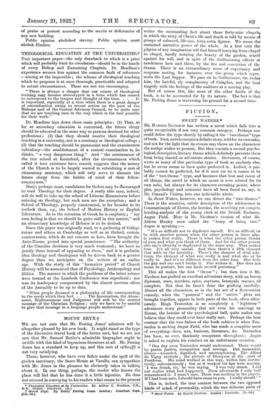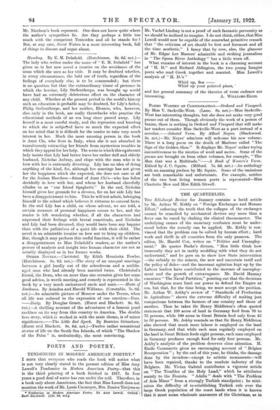FICTION.
SWEET WATERS.*
MR. HAROLD NICOLSON has written a novel which falls into a quite recognizable if not very common category. Perhaps one
could define the type shortly by calling it the "two-theme" type of book. Such novels contain a definite story, told for its own sake, and not for the light that its events may throw on the characters the author wishes to present. But they contain a second psycho- logical, descriptive, literary theme which definitely prevents them from being classed as adventure stories. Stevenson, of course, wrote as many of this particular type of book as anybody else, but he never seems to have quite perfected it. Indeed, it pro- bably cannot be perfected, for if it were (or is) it ceases to be
of the " two-theme " type, and becomes that best and rarest of all things, the novel in which no event is ever related for its own sake, but always for its character-revealing power, where plot, psychology and comment have all been fused as, say, in Mr. Conrad's Victory, into one indivisible whole.
In Sweet Waters, however, we can detect the " two themes." There is the sensitive, subtle description of the adolescence in
Constantinople of Eirene, the heroine, the searching yet compre- hending analysis of the young clerk at the British Embassy, Angus Field. Here is Mr. Nicolson's version of what Mr.
Aldous Huxley once called the " irony of being two." Angus is speaking :—
" It's so difficult not to duplicate oneself. It's so difficult to be with another person when the other person is there also. It makes four really. There is what the other person thinks of you, and what you think of them. And for the other person also one's identity is duplicated in the same way. That makes four. It's all very unreaL And than there's a fifth element, that adds to the unreality. There's the element of rival rela- tions, the element of what one really is and what she or he really is. And it's so different from the other four. One feels the gap and one can't bridge it. One widens it. One does not mean to posture, but one finds oneself posturing."
This all makes the first " theme " ; but then into it Mr.
Nicolson has grafted an excellent adventure story, with an heroic diplomat, wars, murders, spies, captures, betrayals, rescues, all complete. Not that he hasn't done the grafting carefully. Almost all the characters, as in the last act of a Restoration comedy, when the " pastoral " and the " satiric " plots are brought together, appear in both parts of the book, often alter- nately. Hugh Tenterden is so completely a " highbrow " adventure story personality that not even his marriage to Eirene, the heroine of the psychological half, quite makes one believe that they could ever have really met. Perhaps the best contact that the two halves of the book achieve is when Ten- terden is sacking Angus Field, who has made a complete mess of everything—love, war, business, literature, &c. Tenterden has been, as ever, flawlessly competent throughout ; Angus is asked to explain his conduct on an unfortunate occasion.
" One day even Tenterden would understand. There would be poetic justice, recognition and revenge. But meanwhile silence—wounded, dignified, and uncomplaining. The Alfred de Vigny attitude ; the picture of Dionysus at the .iourt of Pentheus. His mind worked in this way, within him instinc- tively, subconsciously ; but as it worked his lips were moving. I was drunk, sir,' he was saying. ' I was very drunk. I did not realize what had happened. Even afterwards I only half remembered it. I wasn't sure. There was nothing in the papers. If I had been sure, I should have come to you. I really should.'
This is, indeed, the true contact between the two opposed kinds of mind, of personality, which the two different parts of • Sweet Waters. By Harold NIC01801). London Constable. 170. ed.] Mr. Nicolson's book represent. One does not know quite where the author's sympathies lie. Are they perhaps a little too much with the competent Tenterden and all he stands for ? But, at any rate, Sweet Waters is a most interesting book, full of things to discuss and argue about.



































 Previous page
Previous page